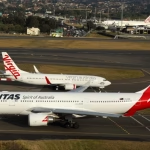After less than three months, Red Way, based in Lincoln, Nebraska, shocked many by announcing its closure. They attribute this surprising decision to rising operational costs and lack of resources. The news triggered reactions throughout the aviation community.
Airline passengers received direct communications, in which Red Way expressed its regret for the «difficult conclusion» and promised full refunds for booked flights.
What Happened Behind the Scenes?
A key piece in this puzzle was the termination of the contract with Fly Next LLC, which was in charge of the operations. Additionally, the Lincoln Airport Authority expressed its disappointment and concern. John Olsson, leading the Authority, conveyed his intent to review the situation to optimize service to the community.
Another challenge Red Way faced was the holding of ticket revenues. This practice limited their cash flow, as funds were only released after passengers completed their flights.
Steve Glenn Highlights Refund Guarantees
Steve Glenn, leader of Executive Travel, acknowledged the financial strain this model might have caused the airline. However, he emphasized that holding the funds guarantees refunds to passengers. For those with upcoming flights, Red Way’s last departure will be on August 31st.
A Look at Red Way
In March, Red Way launched with financial backing of $3 million from the American Rescue Plan. Its inaugural flight to Orlando departed on June 8th, selling 6,000 tickets in its first two weeks. With expansion plans underway, the airline announced new destinations, but also cancellations, showing its ongoing adaptation to the market.
See Also: New virtual airline: Red Way will operate GlobalX planes from Nebraska
Red Way’s Business Model
Operating as a virtual airline, Red Way employed the «wet leasing» model. This involves leasing aircraft and crew, in this case, from Global Crossing Airlines in Miami. Their streamlined business model allowed them to remain agile in the market.
With an operating certificate from the U.S. Department of Transportation, they marketed tickets traditionally through their online platform and travel agencies.













